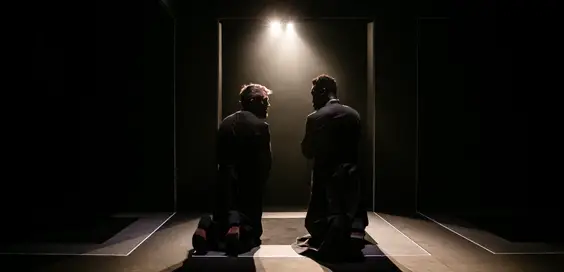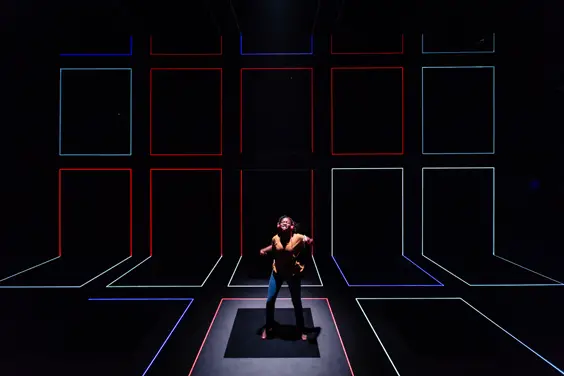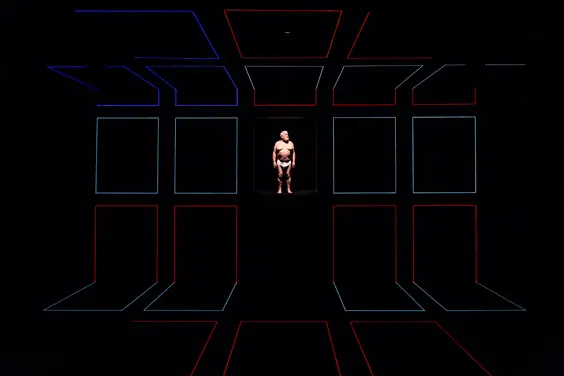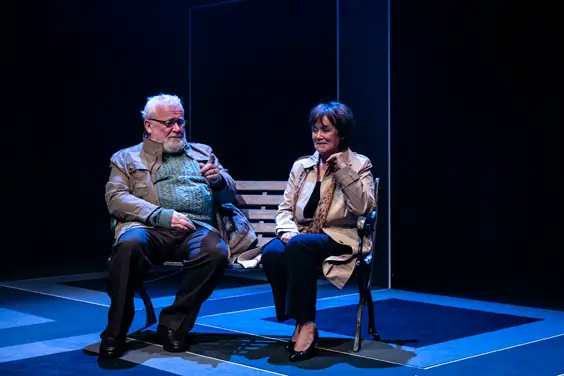Love and Information – Review – Sheffield Crucible Studio

By Eve Luddington, July 2018
Caryl Churchill has been ahead of the playwriting game since she began her career more than half-a-century ago. She always has her pulse on the moral, social and political issues of the day and continually explores context, structure and language to invent new theatrical forms. Love and Information is certainly no exception. First produced at the Royal Court Theatre, London, in 2012, this is its regional premiere. Caroline Steinbeis, director of this production, says: ‘There’s not one playwright now not influenced by her – she’s already done their experiments.’
Love and Information is a kaleidoscope of more than 50 scenes, some only a few seconds long and some much longer, each a playlet in itself. Churchill allows the scenes to be played in any order within a specified section, and says some scenes are dispensable. Few of them are given a context. There are more than 100 characters but the script doesn’t indicate who says what. So, while the first production had 16 actors, Steinbeis has found a way of using just 6.
“Explosion of information”
Are you overloaded with information yet? That’s just how some of the characters feel. Love and Information examines, among other things, the explosion of information technology. She explores the dichotomy between our drive, as human beings, to acquire, use and spread information, and our inability to cope mentally and emotionally with our knowledge. Churchill’s structure and style match the content perfectly.
Steinbeis and her Designer, Max Jones, must have spent months before rehearsals turning what might be an impenetrable intellectual exercise into a stageable production. I suspect it helped that Steinbeis was working at the Royal Court during the first production when Caryl Churchill herself was part of the creative team.
“Struggling to connect”
The set they have come up with in the Crucible Studio is powerful. We’re faced with a huge grey rectangular flat on two storeys. On each level are five identical rectangular frames, at times outlined with tubular lighting. The floor pattern is almost a reflection, with two rows of identical black and grey squares. The starkness suggests emotionless sterility but when the performance begins, we understand the importance of the intro music, a beautiful harmony of interweaving voices composed by Ben and Max Ringham. This play is called Love and Information. The characters trying to navigate this world are a vast array of human beings, with hearts and soul.
And the actors? ‘They’ve got their work cut out’, says Steinbeis. ‘There’s going to be mayhem backstage.’ It didn’t show onstage at all. The cast do a remarkable job in presenting a vast range of characters in so many unconnected playlets, greatly facilitated by the direction and design, and the support of unobtrusive but brilliant stage management.
Scattered amongst the dialogue scenes are others which are sung, whispered or mimed. One uses a series of sound effects made by the actors. Others use puppets. Some are funny, some tender. Most of them present people struggling to connect with one another in a world of rapid communication.
“De-personalisation”
Here’s a flavour of a few: A landlady introduces a new young tenant to her house. There is no radio, tv, or internet. The tenant is frightened. A woman with dementia cries out in distress: ‘I won’t be able to sleep until I know.’ An insomniac tells her husband, ‘My head’s too full to sleep… think I’ll go on Facebook.’
Some deal with de-personalisation. One woman states baldly to another, on air: ‘Mum’s not your mum. I am. Your mum’s your nan.’ An employee complains to her boss that he’s fired her by email. When she demands he tell her to her face, he tells her to make an appointment with his P.A..
Christmas. Family members ignore the elderly man in the corner as they watch a wedding video. They imagine the benefits if the entire history of the world were on film but have no actual memory of the wedding itself except for the ring and someone being sick.
“Snapshots of life”
A man describes how he’s fallen in love as never before – with a computer voice. ‘Sex essentially is information,’ declares a woman to her partner who asks, ‘You don’t think that while we’re doing it, do you?’
Most hopeful for me were the old lovers meeting again on a park bench as sundry other characters speed past. From their different memories of the relationship, they might have been having separate affairs – but there is no doubt of their love. Marian McLoughlin and Ian Redford play the scene with gentle, affecting tenderness and astonishingly, bring depth to the couple.
It’s a great production, dazzling and dizzying, a huge credit to the director and her team. But for me the play remained, at times, impenetrable. Is this deliberate? Perhaps it’s for people to find their own points of contact and meaning. Certainly, Churchill doesn’t have an overt message; she gives snapshots of life in the modern world.
“Demands full concentration”
I had two problems, not helpful in a play which demands full concentration from the audience and runs for 1 hour 45 minutes without interval. Seating on tier 1 felt cramped and uncomfortable: my companion got cramp. Also, I have a slight hearing loss. It’s usually corrected very effectively by hearing aids – but I did miss some of the dialogue last night and in this play the language is vitally important.
When I got home, I felt as if I was in another, unwritten scene: I’d been scribbling away throughout the performance for fear of not hearing or remembering enough to write a review. Because I’d taken so many notes, I could ‘remember’ more than my companion did. But at home, realising I had too much information, I didn’t know how to use it. Bewildering, disturbing. Like many of the characters, I was trying to connect and understand but didn’t quite know how to.
If you enjoy an intellectual challenge and to leave the theatre puzzling over a play, this is one for you.
images: The Other Richard













